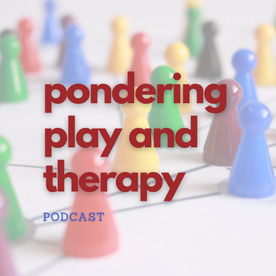Play and can it be learnt?
Welcome to a reflective exploration of play and its significance in our lives, drawn from an insightful conversation between Philippa and Julie on their podcast "Pondering Play and Therapy." This discussion unveils the deep connections between play, development, and emotional well-being, whilst addressing how and when play can be learned or re-learned throughout our lives.
4/27/20252 min read


The Gentle Power of Play: From the Very Beginning
Play is often called the language of children, but its story begins even before a baby takes their first breath. In the womb, babies already begin exploring—responding to sound, touch, and movement. After birth, this natural instinct to interact continues through coos, smiles, and silly games like blowing raspberries. These early moments may seem simple, but they lay the foundation for a child’s physical and emotional development.
Julie shared a beautiful observation: a newborn joyfully engaging with their family, soaking in every smile and voice. It’s in these early, playful exchanges that a baby begins to understand who they are and how they fit into the world. Play becomes a dance of connection, identity, and communication.
Building the Body Through Play
As babies grow, play takes on a physical dimension. Philippa highlighted how foundational movements—like tummy time, rolling, and reaching—are essential in building the strength and coordination needed for everyday tasks later in life. These seemingly small acts prepare children to sit, eat, write, and more. When play is missing, physical development can lag, creating obstacles not just in motor skills but in confidence and independence.
The Emotional Landscape of Play
Beyond muscles and milestones, play nurtures the heart. A playful, caring environment supports a child’s ability to form secure attachments, build self-esteem, and navigate relationships. Philippa and Julie both emphasised how crucial responsive, engaged play is. Without it, children can feel emotionally adrift—longing for connection but unsure how to seek it.
When Adults Didn’t Get to Play
But what happens when adults themselves missed out on this kind of playful connection as children? For some parents, play doesn’t come naturally—it’s unfamiliar, even intimidating. Philippa has worked with parents learning to play for the very first time, describing it as both a joyful awakening and a mourning of what was missed. In therapy, these adults are often gently guided into childlike roles, giving them the chance to be cared for in ways they may never have experienced. From this place of healing, new patterns of connection and play can emerge.
Healing Through Play
Julie and Philippa both advocate for therapeutic approaches that invite adults into play—not just as a parenting tool, but as a healing experience. It’s not enough to explain how to play; it must be felt. When adults rediscover playfulness, they unlock not just joy for themselves, but the ability to share that joy with their children in authentic, lasting ways.
A Lifelong Invitation
The beauty of play is that it never truly leaves us—it waits patiently for us to return. Whether you’re a parent, a caregiver, or simply someone on a journey of rediscovery, there’s always a path back to play. It’s in shared laughter, spontaneous moments, and curious exploration. Julie and Philippa remind us: play is a lifelong invitation to connect, to grow, and to heal.
No matter your age, it’s never too late to begin playing again.
